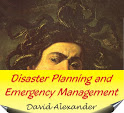Having decided to embark on a research project, the first big hurdle is “how do I do this?” or “what do I do next?” Obviously, it is a bigger problem for PhD theses than for a one-year master’s, in which less than half of the year is devoted to the thesis. I defined my own PhD as one year of optimism, one year of desperation and one year of salvaging something from the wreckage (but I did get it done in three years and got it passed by the examiners with minor amendments).
I often see students floundering in those early stages. The question of “how to define a research project and get on with it” can feel like a slippery cliff face on which there are no hand- and toe-holds. Here are some reflections on how to get to grips with the problem.
If there is one thing you need to learn first and foremost, it is clear, logical thinking: thinking that is unencumbered by “ifs” and “buts” and “also”. Thinking with a logical progression: A leads to B leads to C. Develop a framework based on logical connections between the parts. One key word is ‘feasibility’. If your investigation takes a particular direction, can it be done in three years? Is it likely to produce results?
Developing a viable research project involves striking a delicate balance between taking risks and playing safe. The project needs to be innovative, but not to the extent that it is too ambitious to succeed.
When I was at school, I was taught graphical linear programming, which is a rather rudimentary way of mathematically optimising several variables by achieving the best possible compromise between them. Designing a research project is rather like that. The variables are:-
- time: how long will the project last and when are the deadlines?
- resources: what can be afforded, for example regarding travel and equipment?
- size: how big can (or should) the data set be?
- significance: what makes this worthwhile?
- content: what am I trying to do?
The foundations of the project can be assembled by thinking up its key words. These can be as many as needed and can be geographical (where?), topical (what?), methodological (how?), and temporal (when?). It is better to start with a small and modest idea rather than a grandiose one. If it turns out to be too modest, it is almost always far easier to scale up than to whittle down.
In a research proposal it is not what you know, it is what you intend to do that matters. This therefore needs detail and requires a concrete approach. Your central issue is how to construct a data set. Hence, you can even start from that and work back to your research questions. It is not the orthodox way of doing things, but it works in a crisis!
A hypothesis is a testable proposition, a postulate to be examined. Hypotheses are remarkably difficult to construct. They need to tread the fine dividing line between being trivial and being too difficult to test. Probably the best way to arrive at a testable hypothesis is to read the literature in a critical frame of mind. What relationships are suggested but, at least in certain circumstances, not proven? Virtually all hypotheses need to be causal, and to deal with causes that are not obvious: indeed, in the end the hypothesised causes or relationships may or may not exist.*
All research students should be fully aware of the distinction between inductive and deductive reasoning. The weakest thesis projects are those that rely on a “look-see” descriptive approach. Deduction is a much more efficient form of enquiry. Successful, functional hypotheses are by their very nature deductive. A hypothesis such as “Flood response is not very effective in _______” is not a good one. To ascertain whether the response to floods is good or bad is a matter of judgement and perhaps appropriate measurement. It does not tax the brain very much. A better hypothesis would involve an educated guess about why flood response is poor. Hypotheses are about causal relationships.
One of the first tasks of a research student is to read the literature on the topic in question. This often leads to the writing of a literature review that is unfocussed, poorly organised and far too broad. The whole purpose of the review should be to ascertain (a) what we already know about the specific topic of the research (i.e., to create a starting point for a new enquiry), and (b) to identify the gaps in knowledge of the topic that are worthy of research and have potential to conduct it.
A dissertation will need a data set. Herein lies a paradox. The data set will refer to a very specific question, place, phenomenon or whatever, but the results of analysing it will have to feed back into much larger issues. In my own doctoral research I studied 300 metres of stream channel but in so doing grappled with the question “does randomness exist?” If I did not solve it, at least it was fun and edifying to try.
So how does one stop floundering when it is necessary to formulate the great research project. First, concentrate on the essentials: (a) what you want to find out, (b) the ‘why?’ of it and causality, and (c) most importantly, the methodology and work plan - in as much detail as possible. If necessary, work back to the research questions and hypothesis from reasoning about what the data set should consist of and what secrets it is likely to yield.
*The American journalist H.L. Mencken wrote rather disparagingly that "a professor must have a theory as a dog must have fleas." Perhaps, but irritating as theories are, we cannot do without them, whereas a dog can do without fleas very well.

